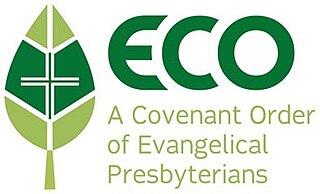
Presbyterianism is a Reformed (Calvinist) Protestant tradition named for its form of church government by representative assemblies of elders. Though there are other Reformed churches that are structurally similar, the word Presbyterian is applied to churches that trace their roots to the Church of Scotland or to English Dissenter groups that formed during the English Civil War.

The Presbyterian Church (USA), abbreviated PCUSA, is a mainline Protestant denomination in the United States. It is the largest Presbyterian denomination in the country, known for its liberal stance on doctrine and its ordaining of women and members of the LGBT community as elders and ministers. The Presbyterian Church (USA) was established with the 1983 merger of the Presbyterian Church in the United States, whose churches were located in the Southern and border states, with the United Presbyterian Church in the United States of America, whose congregations could be found in every state.
Presbyterianpolity is a method of church governance typified by the rule of assemblies of presbyters, or elders. Each local church is governed by a body of elected elders usually called the session or consistory, though other terms, such as church board, may apply. Groups of local churches are governed by a higher assembly of elders known as the presbytery or classis; presbyteries can be grouped into a synod, and presbyteries and synods nationwide often join together in a general assembly. Responsibility for conduct of church services is reserved to an ordained minister or pastor known as a teaching elder, or a minister of the word and sacrament.

The Presbyterian Church in America (PCA) is the second-largest Presbyterian church body, behind the Presbyterian Church (USA), and the largest conservative Calvinist denomination in the United States. The PCA is Reformed in theology and presbyterian in government.

The Cumberland Presbyterian Church is a Presbyterian denomination spawned by the Second Great Awakening. In 2019, it had 65,087 members and 673 congregations, of which 51 were located outside of the United States. The word Cumberland comes from the Cumberland River valley where the church was founded.

The United Presbyterian Church in the United States of America (UPCUSA) was the largest branch of Presbyterianism in the United States from May 28, 1958, to 1983. It was formed by the union of the Presbyterian Church in the United States of America (PCUSA), often referred to as the "Northern" Presbyterian Church, with the United Presbyterian Church of North America (UPCNA), a smaller church of Covenanter-Seceder tradition at a conference in downtown Pittsburgh, Pennsylvania, in May 1958. Vigorous ecumenical activity on the part of PCUSA leaders led to this merger, something of a reunion of two long-separated branches of the larger Presbyterian family deriving from the British Isles.

The Presbyterian Church in Canada is a Presbyterian denomination, serving in Canada under this name since 1875. The United Church of Canada claimed the right to the name from 1925 to 1939. According to the Canada 2021 Census 301,400 Canadians identify themselves as Presbyterian, that is, 0.8 percent of the population.

Presbyterian Church of East Africa (PCEA) is a Presbyterian denomination headquartered in Nairobi, Kenya. In Kenya, 10% of the population is Presbyterian. It was started by missionaries from Scotland, most notable of whom was Dr John Arthur. It has its headquarters in Nairobi South C.
Attitudes in Presbyterianism toward homosexuality vary, ranging from outright condemnation to complete acceptance.

The Old School–New School controversy was a schism of the Presbyterian Church in the United States of America which took place in 1837 and lasted for over 20 years. The Old School, led by Charles Hodge of Princeton Theological Seminary, was more conservative theologically and did not support the revival movement. It called for traditional Calvinist orthodoxy as outlined in the Westminster standards.
Synod of the Northeast is an upper judicatory of the Presbyterian Church (USA) based in East Syracuse, New York. The synod oversees 19 presbyteries in six New England states, two of the three Mid-Atlantic States, plus a non-geographical Korean Presbytery.
The Presbyterian Church of India (PCI) is a mainline Protestant church based in India, with over one and a half million adherents, mostly in Northeast India. It is one of the largest Christian denominations in that region.

ECO: A Covenant Order of Evangelical Presbyterians is an evangelical Presbyterian denomination in the United States. As a Presbyterian church, ECO adheres to Reformed theology and Presbyterian polity. It was established in 2012 by former congregations and members of the Presbyterian Church (USA), abbreviated PC(USA). Denominational disputes over theology—particularly ordination of practicing homosexuals as pastors and gay marriage—and bureaucracy led to the founding of ECO. In 2018, ECO has over 383 congregations, 103,425 covenant partners and over 500 pastors. ECO churches are egalitarian in beliefs and ordain women as pastors and elders.

The National Presbyterian Church in Mexico is the second-largest Protestant church, and the largest Reformed denomination in Mexico. It is present throughout the country, and is particularly strong in the states of Tabasco, Chiapas, Campeche, Yucatan, Nuevo León, Aguascalientes and Mexico City.
The Presbyterian Church in Liberia is a historic church in Liberia in the Presbyterian Reformed tradition. It was formerly a Presbytery of the Cumberland Presbyterian Church, now it is an independent, self-governing denomination.
The Reformed Church in Japan is a confessional Calvinist denomination in Japan. It was formerly a member of the World Communion of Reformed Churches, but it chose to suspend its membership.

Presbyterianism has had a presence in the United States since colonial times and has exerted an important influence over broader American religion and culture.
The Synod of Lakes and Prairies is a regional governing body of the Presbyterian Church (U.S.A.). It consists of presbyteries located in Iowa, Minnesota, Nebraska, North Dakota, South Dakota, and Wisconsin, and one non-geographic presbytery. The Synod of Lakes and Prairies consists of 16 Presbyteries:










